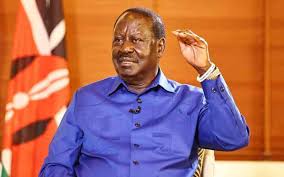Kenya came to a standstill on Thursday morning as the body of the late former Prime Minister Raila Amolo Odinga arrived in Nairobi from Kerala, India, where he passed away from a heart attack on Wednesday.
The body landed at Jomo Kenyatta International Airport (JKIA) shortly before 10 a.m., met by heavy security, family members, government officials, and thousands of emotional supporters.
Even before the plane touched down, crowds of mourners had already flooded the airport, chanting Raila’s name and waving flags and portraits in his honor.
Security officials struggled to control the surging masses as people attempted to catch a glimpse of the casket carrying one of Kenya’s most iconic leaders.
Raila Odinga, 80, served as Kenya’s Prime Minister from 2008 to 2013 and was widely regarded as a champion of democracy and social justice. His death has sent shockwaves across the country, with tributes pouring in from local and international leaders, including former U.S. President Barack Obama, who described him as a “true champion of democracy.”
Following his arrival in Nairobi, Raila’s body was taken to the Lee Funeral Home for preservation before public viewing at Kasarani and Jomo Kenyatta Stadium in Mamboleo, Kisumu. His state funeral is scheduled for Sunday, October 19, where he will be laid to rest at his Bondo home in Siaya County.
The government has declared three days of national mourning, with flags flying at half-mast across the country.
Meanwhile, thousands of Kenyans have continued to line up in long queues at viewing centers, singing liberation songs and carrying flowers as they pay their last respects to the man many affectionately called “Baba.”
Security agencies have urged calm following minor stampedes reported during earlier viewings, with Raila’s brother Oburu Odinga appealing for peaceful mourning, saying, “Raila was teargassed enough in life; let’s not teargas him in death.”
As Kenya prepares to bid farewell to one of its most influential political figures, the air is heavy with emotion, unity, and a shared sense of loss — marking the end of an era in the country’s long journey toward democracy.



